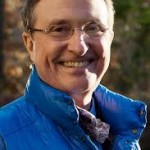Prof. Thomas Lovejoy heads the Biodiversity Program at the Heinz Center in Washington, DC
Innovative conservation biologist Thomas E. Lovejoy presented “Climate Change: A Wild Solution” on Thursday, January 31st in the Lugar Courtroom at the West Virginia University College of Law. The public was invited to attend.
In his lecture, Lovejoy explored the past and present impacts of climate change on nature and biodiversity, as well as how managing ecosystems could significantly reduce the amount of climate change that will occur.
A recipient of the 2012 Blue Planet Prize for lifetime achievement in conservation, Lovejoy developed the “debt-for-nature” swap program that trades foreign debt for environmental protection projects. It is one of the largest sources of financing for international conservation, resulting in more than $1 billion in funding since 1987.
Lovejoy has been an advisor to the World Bank, the United Nations, the World Wildlife Fund, the Smithsonian and presidents Ronald Reagan, George H.W. Bush and Bill Clinton. He is currently the biodiversity chair at the Heinz Center for Science, Economics, and the Environment in Washington, D.C. He is also an environmental science and policy professor at George Mason University. Lovejoy founded the long-running TV series Nature on PBS, and was the first to use the term “biological diversity” in 1980.
“It is no exaggeration to say that Tom Lovejoy has devoted himself most dedicatedly, and single-mindedly, to the welfare of this earth,” said Michael Blumenthal, visiting assistant professor of law. “For almost a quarter century, he has worked on the interaction between climate change and biodiversity and been a major force in saving the Amazon from total deforestation. Having him here at WVU to discuss these issues provides us with a rare opportunity to have a major thinker and activist provide examples of ways in which we can assure that there will indeed be a planet for our descendants to inhabit and to celebrate.”
See the presentation here:
See the same topic presented in September of 2012 here:
See information on Biodiversity at the Heinz Center here:

